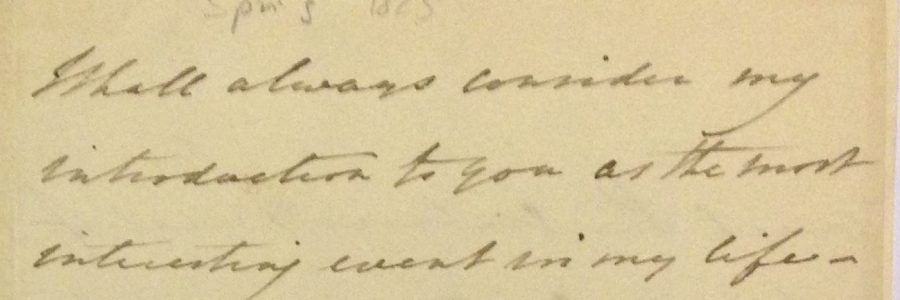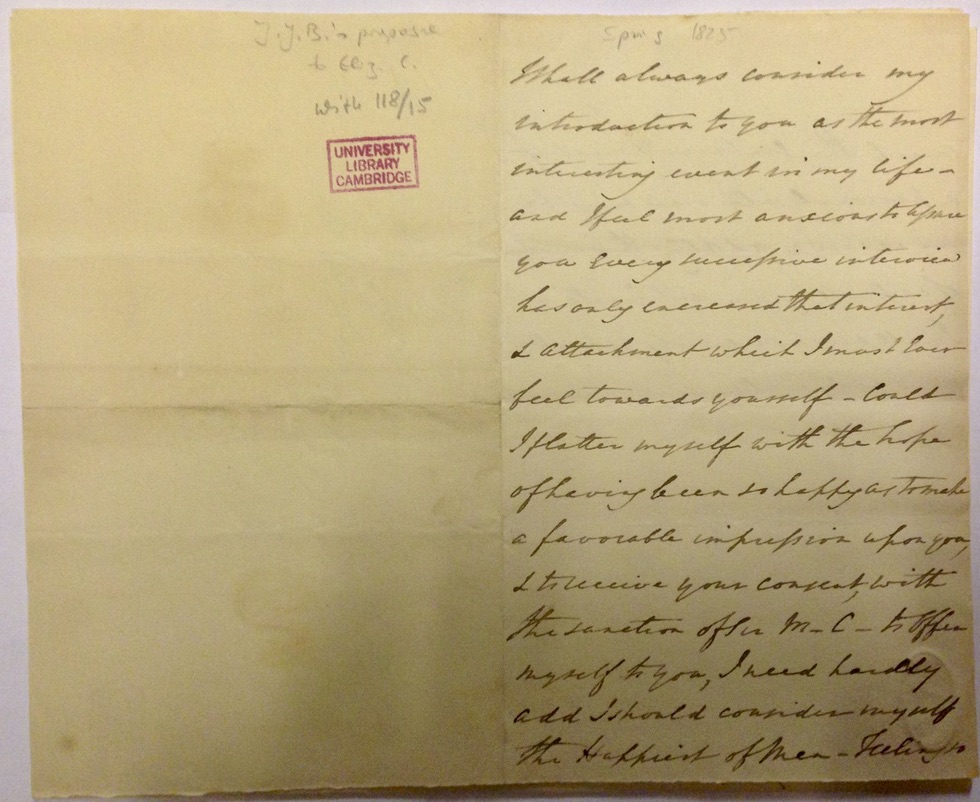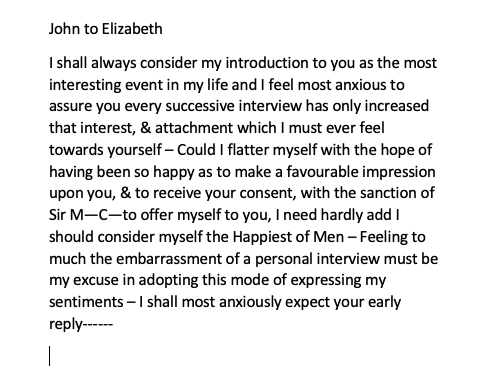
‘Happiness in marriage is entirely a matter of chance’: an 1825 proposal of marriage
One of the things that I love most about archives is their ability to bring us closer to those who lived in the past. They provide us with a physical connection and also make us realise that previous generations had similar feelings and concerns to us. A few weeks ago I noticed a reference from 1825 to a proposal of marriage in two letters in the Buxton family catalogue in the Department of Archives and Modern Manuscripts. I couldn’t resist having a look. The exchange between John Buxton and Elizabeth Cholmeley is utterly charming and made me think it would not have been out of place in a Jane Austen novel.
‘I shall always consider my introduction to you as the most interesting event in my life’
CUL Buxton 118/15 John Jacob Buxton to Elizabeth Cholmeley

CUL Buxton 118/15 Letter from John Jacob Buxton to Elizabeth Cholmeley, 1825 
John admitted that he was too embarrassed to propose in person and instead wrote a brief but heartfelt letter to Elizabeth Cholmeley, hoping that she would accept his offer of marriage. Elizabeth’s longer and more fluent reply allows us to glance into the background of this relationship. She refers to an observation that John made one evening about the happiness of marriage depending on ‘an accordance of disposition and sentiments’. We can assume from this comment that John had been dropping a few subtle hints about marriage during their meetings!

Elizabeth is also clear that an acquaintance formed ‘in mixed company and in places of public amusement’ is not enough to make a decision about the lifelong commitment of marriage. I was struck by this phrase because it reminded me of the conversation between Frank Churchill and Jane Fairfax during the Box Hill incident in Emma. Frank’s words about the apparently happy marriage of the Eltons are aimed at his secret fiancée, Jane, to whom he became engaged after a short acquaintance in Weymouth, then a public watering place:
‘They only knew each other, I think, a few weeks in Bath! Peculiarly lucky! – for as to any real knowledge of a person’s disposition that Bath, or any public place, can give – it is all nothing; there can be no knowledge. It is only by seeing women in their own homes, among their own set, just as they always are, that you can form any just judgement.’
Jane Austen, Emma
We don’t know whether Elizabeth was a reader of Jane Austen but her letter certainly reflects some of the same thoughts about marriage articulated by an aggrieved Frank Churchill.
Elizabeth made it clear that she would not accept John’s proposal until she had a chance to talk to him privately, face-to-face. If John was too embarrassed to propose in person, I imagine that a summons to be interrogated about his sentiments ‘upon the most important duties in life’ made him quake in his boots!

Of course we can never know the true feelings of either party but these two elegantly written letters shine a light on what would have been both a personal and a public relationship. The marriage had to be regarded as ‘suitable’ by both families and would no doubt be a matter of comment among their neighbours and acquaintances.
For those of you curious to know how it ended and whether John was successful in his proposal, I can reveal that Elizabeth and John were married on 5 August 1825 at St George’s church in Hanover Square. They went on to have three children and appeared to have a happy marriage until John’s death in 1842 at the age of 54. Elizabeth died in 1884, aged 80.
Intriguingly, I noted another link to Emma: the ages of John and Elizabeth at the time of the proposal were 21 and 37 – the same ages as Emma and Mr Knightley.
I was delighted to discover that portraits of both Elizabeth and John are held by Norfolk Museums Service: https://www.artuk.org/discover/artworks/elizabeth-lady-buxton-nee-cholmeley-d-1884-1137 and https://artuk.org/discover/artworks/sir-john-jacob-buxton-17881842-2nd-bt-1136

